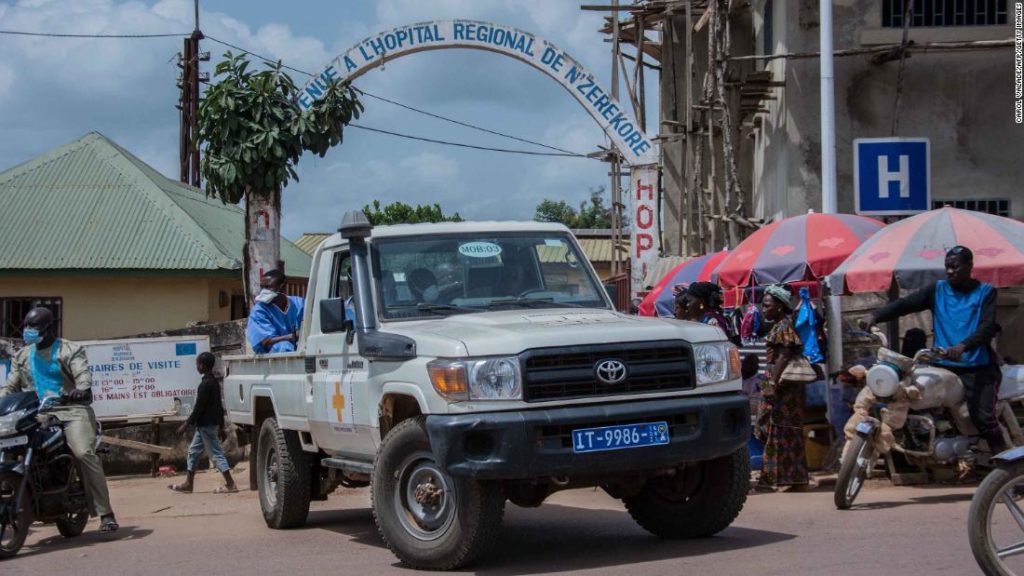The World Health Organization (WHO) is carrying out further investigations into the individual who appears to have had the virus lay dormant in their body.
This would suggest infections may persist once people recover and have the potential to start a future outbreak.
International researchers, including a team at the University of Conakry in Guinea, sequenced the genome of nine samples taken from people infected during the current outbreak and compared them against sequences from previous outbreaks to help identify the cause.
The results suggest the latest outbreak “is the result of the resurgence of a strain that previously circulated in the West African outbreak,” the authors wrote in their analysis.
“The similarities are big enough for us to declare that this is the same family of the virus,” says Dr. Salam Gueye, director of the Emergency preparedness and Response Cluster at the WHO Regional Office for Africa.
But Dr. Alpha Keita, Deputy Director of the Centre de Recherche et de Formation en Infectiologie de Guinée (CERFIG) at the University of Conakry, who led the research, said his team have refrained from making any hasty conclusions.
They decided to be extremely careful and continue sequencing on additional samples to obtain more complete sequences that will provide a safer answer, he added.
In a separate report about the work, Keita explained that the implications in terms of public health and the safety of people, such as the risks of stigmatization, physical and verbal violence among previous Ebola sirvivors, called for such an approach.
Gueye said further investigations are now underway to see what exactly happened.
Guinea’s Ministry of Health declared a new outbreak of Ebola virus disease in the country’s Nzérékoré region on February 14. As of 25 March, 18 cases have been reported, including 14 confirmed and four probable cases. Nine people have died and 366 contacts are being followed up.
The latest outbreak started just 200 km from the epicenter of the previous epidemic, according to the researchers.
A sexually transmitted virus?
The nurse was an in-law to the spouse of the survivor who is thought to have carried the virus for five years. The spouse subsequently died of Ebola virus disease, the nurse soon developed the disease and is believed to have transmitted it to other people during the funeral. “That is how the outbreak may have started,” said Gueye.
Teams at CERFIG then sequenced the nine samples from people testing positive for Ebola, with the Makana variant identified in these samples.
The virus may have been latent and subsequently sexually transmitted from one person to another or the virus was present in the body and not causing illness, but due to virus mutation or host immunity going down it caused a relapse, Gueye told CNN.
“We are continuing to do epidemiological and anthropological investigations in order to reinforce that hypothesis or exclude it but so far that is the strongest hypothesis we have,” said Gueye.
Wim Van Damme, a researcher and infectious disease expert at the Institute of Tropical Medicine, Antwerp, who was not involved in the research, cautions that this method of transmission would be a very rare event. “There are more than 10,000 Ebola survivors in West Africa, and this is the first case, after five years,” he said.
He added that while many people think the infection was most probably a case of sexual transmission. “That is not for sure because the virus can remain present in other places in the body (mainly in the central nervous system).” But he explains that it’s also unknown how the virus would spread from the nervous system to another human being.
“We need to do supplemental investigations and epidemiological research in order to determine what happened and to have a strong hypothesis on it. There are a lot of facts that have given us enough information for us to react,” Gueye told CNN.
The WHO is working with the West African affected governments and a task force has been formed. “The task force will further go into epidemiology, bioinformatics and laboratory to see what we can learn from this experience and translate it into the program” said Gueye.
The risk of future outbreaks
“The fact is that we need to follow up these survivors for prolonged periods of time with frequent semen analysis for the virus. We can also provide condoms for them,” said Dr. Merawi Aragaw, Incident Manager for Ebola, Africa CDC.
“The community needs continuous education. We are trying to reach the community through health workers they can trust,” said Aragaw, adding that the Africa CDC continuously give survivors psychological support and advise partners and people in the community.
The WHO says it will strengthen surveillance, disease detection and disease responses for countries affected by Ebola.
“It will change the way we are responding to Ebola and the way we are preventing Ebola. It is a disease that needs to be in the surveillance system and it needs a collaboration of the community, the health workers, and also it needs to be a priority for the health authorities,” Gueye said.
Ebola virus disease (EVD) is a rare but severe, often fatal illness in humans. The virus typically spreads through direct contact with the blood, body fluids or tissues of infected people or animals.
The 2014-2016 Ebola epidemic in West Africa was the largest to date, spreading to Liberia, Sierra Leone and Guinea.
A total of of 28,646 suspected cases were reported along with 11,323 deaths.
You may also like
-
Afghanistan: Civilian casualties hit record high amid US withdrawal, UN says
-
How Taiwan is trying to defend against a cyber ‘World War III’
-
Pandemic travel news this week: Quarantine escapes and airplane disguises
-
Why would anyone trust Brexit Britain again?
-
Black fungus: A second crisis is killing survivors of India’s worst Covid wave

